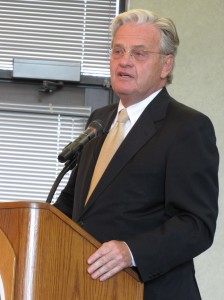By Emily Hostetler
Transcript Reporter
While global economics surpass world boundaries through the internet and social media, economic success may lie in picking the right problems and finding solutions.
Last Friday, Clark Winter ’73, president and founder of Clark Winter enterprises, spoke about making sense of global economics in his lecture “The Global Economy Going Forward: Making Sense of Apparent Nonsense,” as part of the 2012 Robert L. Milligan Leaders in Business Lecture series.
According to Winter’s website, he has worked internationally as an investor and commentator on global financial markets and as a chief investment strategist and spokesperson for global investment firms.
Winter said boundaries determine trade and commerce which have migrated to the internet. When people want to buy things or check a price, they go online rather than to a catalogue or store.
“New boundaries have been determined by something absolutely unprecedented,” Winter said.
“Social media has cut across all known boundaries of empowerment and authority.”
He said when boundaries move, there can be amazing disaster or opportunity.
“Some things are wrong, some things are right,” he said. “Be aware of picking the right problem. Too often you get accustomed to answering a problem simply because you have an answer.”
Winter said a lot of the losses the U.S. has had in the last five years are from the unwinding of minor profits from assets.
Singapore, Korea, most of China, Google and Apple didn’t play the minor assets game and they are free of debt.
“The clear path to prosperity is excess leverage. They (Singapore, Korea, China, Google and Apple) congregated talent,” he said. “Leverage is still wildly available on the planet. It’s not just of money but, it’s of people.”
He said that Google gathered special talent to take society’s inevitable money-makers that were dysfunctional for a number of reasons and then make those systems functional.
“Pick a problem that’s comprehensible, that’s simple, that makes sense,” he said.
Winter said it is important to have clarity, purpose and understanding of how you reallocate size of inevitable cash-flows.
While using of the example of Sony and Apple, Winter demonstrated how simplicity can be useful in order to keep the economy moving forward through job creating exercises.
Sony has hundreds of products that can’t hook up to each other while Apple has only a few products that can intercommunicate and have different horsepower options.
“Think about how many things don’t work and think about being a solution provider, and bringing the efficiency to that,” Winter said.
Winter explained how people would spend much more money on lottery tickets if they could be online instead of having to physically walk somewhere to buy tickets.
This would once again remind future entrepreneurs how valuable the Internet can be.
Senior Rachel Piskos, an economics management major, said she agreed with a lot of what Winter said.
“I learned how important technology is when crossing boundaries,” she said.
Winter emphasized how important it is to realize opportunities even if it doesn’t seem like an opportunistic time.
“Change occurs when disaster strikes or when opportunity subtly screams,” he said. “It’s when the passive verb tense takes over, there’s a lack of accountability.”
He said that it is this lack of accountability that is occurring in the current election period.
Senior Laura Finkler, an economics management major, said she appreciated Winter’s use of politics in his lecture.
“He said he didn’t want to talk about politics, but when he did, he made sure to say something about both parties,” Finkler said.
Winter said that the job of politicians of the western world is to see the nation’s economy as a finite amount of resources. He compared this with sharing pizza.
He said people want to try to give and take slices out of a set number of slices of pizza which is much more complicated than making the pizza in the first place.
“Would you rather bake pizza, or divide pizza? You want to bake pizza. It’s a much better to own a pizzeria than to try to divide the pizza,” he said.
“That’s what China did. They said they wanted to own the means of productions rather than divide.”
Winter’s relatable analogies and frequent jokes allowed students, faculty and visitors to become engaged in his lecture on “apparent nonsense.”
“It was good for a Friday afternoon. I got extra credit for my senior seminar in corporate strategy, but the lecture was entertaining and better than some other lectures I’ve attended,” Piskos said.
As a B.F.A graduate, Winter understands the importance of the liberal arts and urges people to think of what mathematics, art, science and all of the subjects have in common, rather than how they are different.
“Some people walk into a messy room and see a golden opportunity,” he said.
“Some people see golden opportunities and only complain. What’s the rhythm, what’s the harmony, what’s the unanimity?”
While Winter’s lecture was based on the global economy, he included other topics and lessons that could correlate with global economics.
“I thought he would talk more about economics, but he didn’t. He didn’t ramble and it was a nice change,” Finkler said.